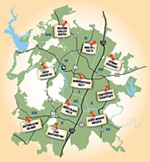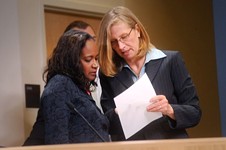Point Austin: Nothing From Something
In Austin politics, the more things change ...
By Michael King, Fri., Jan. 13, 2012

I'm not a betting man – a lifetime of rooting for the White Sox will cure you of at least a few vices – but right now, if I were asked to wager on single-member districts for future Austin City Councils, I wouldn't make that bet. While there's still some time before the Charter Revision Committee makes its recommendation on geographic representation, and then council considers and votes on that recommendation, at the moment the question is shaping up as yet another parochial Austin political battle between the perfect and the good – with both likely to go down not in flames, but in sputtering embers. At least, that's the impression given by the last couple of CRC meetings, especially last week's (Jan. 5), when committee members themselves began to weigh in on the proposed alternatives. The 15-member committee appeared fairly evenly divided on whether to support an entirely geographic system (popularly defaulted to 10-1 – i.e., 10 council members and a mayor) or a hybrid system (some combination of geographic, at-large, and "superdistricts"). The division is understandable – and they've allowed themselves a few more weeks of discussion – but the audible polarization between advocates for single-member districts and those for a hybrid system suggests a conceivable compromise is still a long ways away.
Indeed, Mayor Lee Leffingwell, appearing before the CRC for the first time, opened the public testimony with a brief and fairly plaintive plea for some kind of compromise, declining to "get lost in the weeds" of particular plans but hoping that the committee would come up with something all members – and most importantly, Austin voters – can join together and support. Noting that if a system change does not win voter approval (for a seventh time over a couple of decades), "We may not get another chance for a very long time," Leffingwell urged the committee to settle on a plan it could support and move forward to council as a group. He suggested in particular that a plan that both makes a systemic change and significantly increases the size of council (as the 10-1 plan would) is, based on historical experience, likely toying with the outer edge of potential voter approval.
If the mayor's remarks will have any effect on the committee's deliberations, it wasn't readily apparent from what followed.
Two for One
It's clear that most of the public attendees at CRC meetings, many of them repeatedly rousted by Austinites for Geographic Representation, have supported a purely district plan, and those voices were duly acknowledged by several committee members during the discussion. Others pointed to the testimonial support for pure SMDs by redistricting experts Gary Bledsoe of the state NAACP, attorney David Richards, and Luis Figueroa of the Mexican American Legal Defense and Educational Fund. But it's worth noting that the estimable experts' testimony was mostly based on congressional redistricting experience (which is, nevertheless, a hybrid system) and with little reference to Austin's historical politics. More importantly, it's not at all evident that the folks showing up to these meetings (and bless every one) are at all representative of the city's general voting public – which (must we remind ourselves?) has six times declined to endorse the move to a district system.
That political history was barely acknowledged by the committee, divided as it appears to be between adamant supporters of pure districting and others arguing that some kind of at-large districts might better protect dispersed minorities (especially, it was suggested, Asian-American and perhaps gay Austinites). That pragmatic perspective was represented by two members – Ken Rigsbee, who thinks the current system has been repeatedly confirmed by Austin voters but would defer to 10-1, and David Butts, the longtime political consultant partly responsible for electing every member of the current council.
Rigsbee (appointed by Leffingwell) is in effect the only committee representative of the 35-40% of voters who will likely oppose any change to the current system, especially if it adds council offices (at roughly $250,000 apiece). And Butts cautiously pointed out that however good its intentions, if the CRC doesn't come up with a compromise proposal, there will likely be competing plans on the ballot (AGR is separately collecting 10-1 petition signatures), meaning voter support for a change would be split, meaning Good vs. Good would be defeated by Nothing at All.
Splitting the Difference
Hence my opening skepticism that this latest effort to reform and modernize Austin's archaic system of representation will result in anything other than the same result as the last six attempts. For myself, I think 10 SMDs (the minimum necessary to draw a reasonable African-American opportunity district) would be just fine; indeed, doubling the size of the current council would make plenty of sense for a city this size (although the current electorate would never agree to pay for it). But I'm not so delusional as to believe that my opinion magically represents the general sentiment of the local voters (or at least those who actually vote), who have repeatedly gone to the polls and persisted in their conviction that our Norman Rockwell small town can forever do just fine with a small-town government. Bluntly, that change-resistant tribe will be yearning (at best) for a compromise.
I asked our current minority council members for their response to the dubious truism circulating the CRC meetings: that historically, minority council members have inevitably been selected by white voters. Mayor Pro Tem Sheryl Cole, while acknowledging the overall white-plurality electorate, pointed out that in her initial 2006 election, she strongly carried the African-American boxes (her 2009 re-election was essentially no contest). She's waiting to see what comes to council before she commits on SMDs. Council Member Mike Martinez agreed that while "parsing all the votes across the city" almost inevitably means a white plurality, "that doesn't mean you lack support among minority voters." As for SMDs, he said: "I think we need to have a compromise plan, something the voters will accept. ... If we split the voters in support of a change, those opposed to any change will win."
That seems like a reasonable position – therefore, not necessarily coming to a ballot near you.
Got something to say on the subject? Send a letter to the editor.











